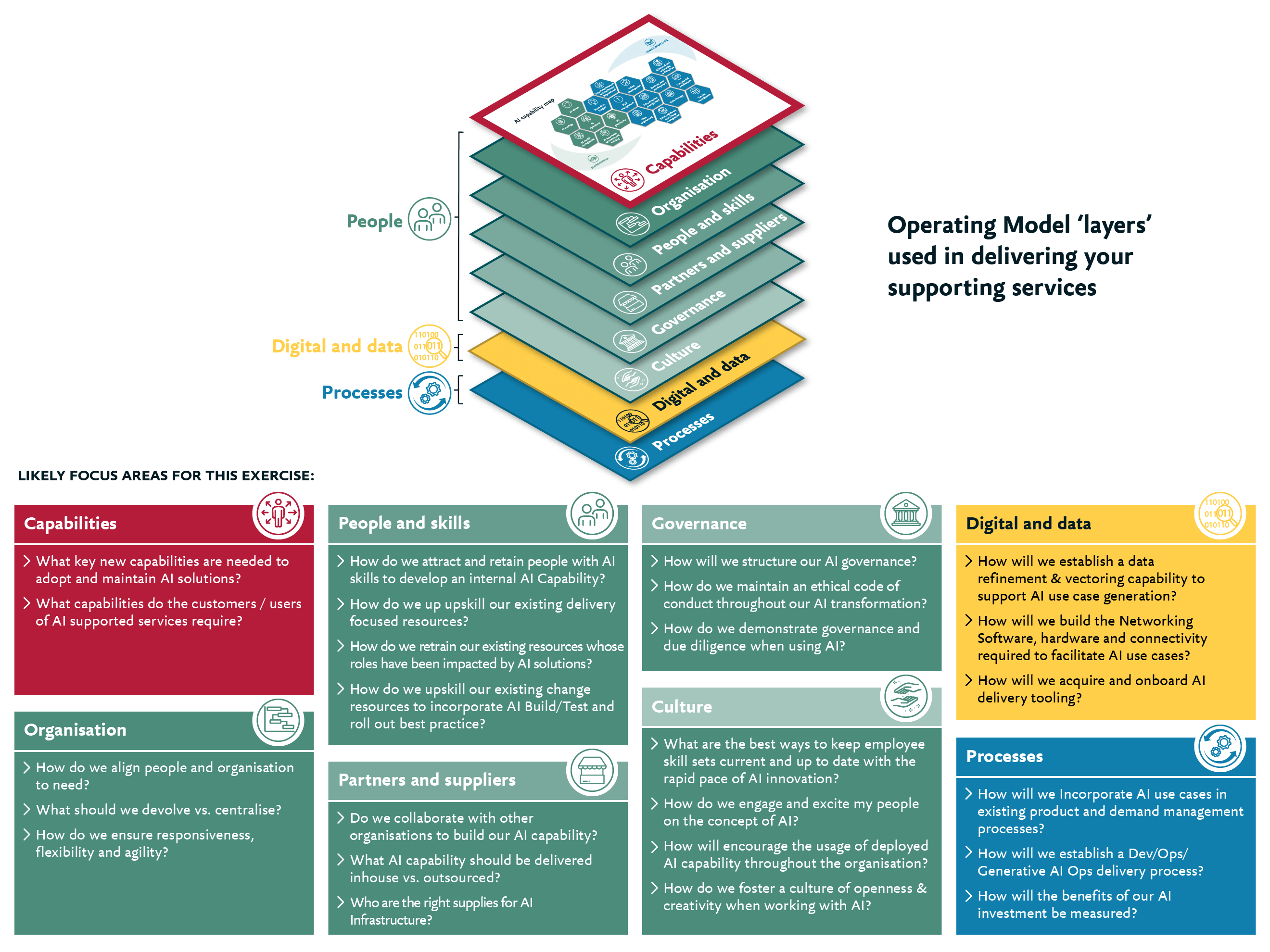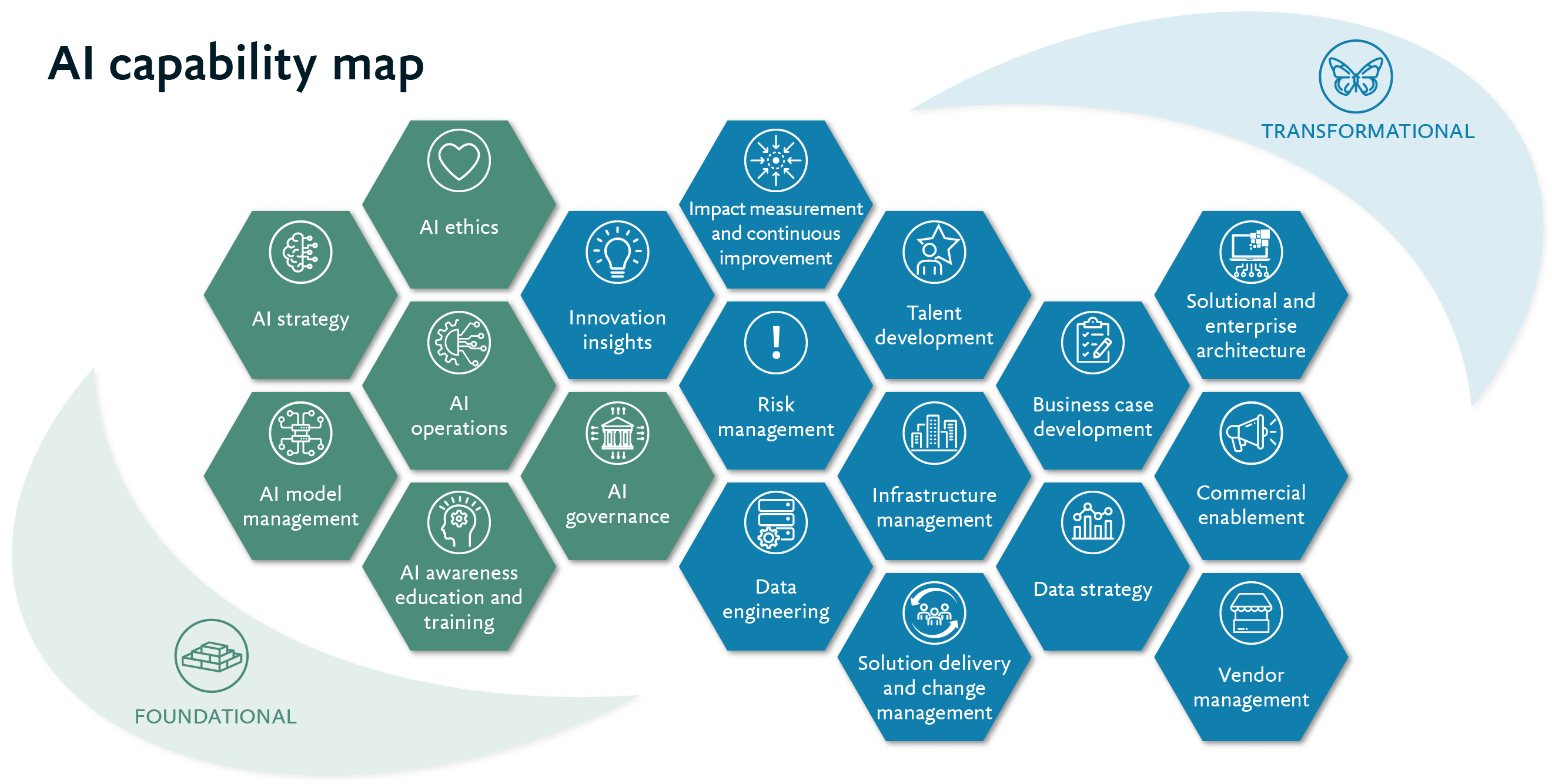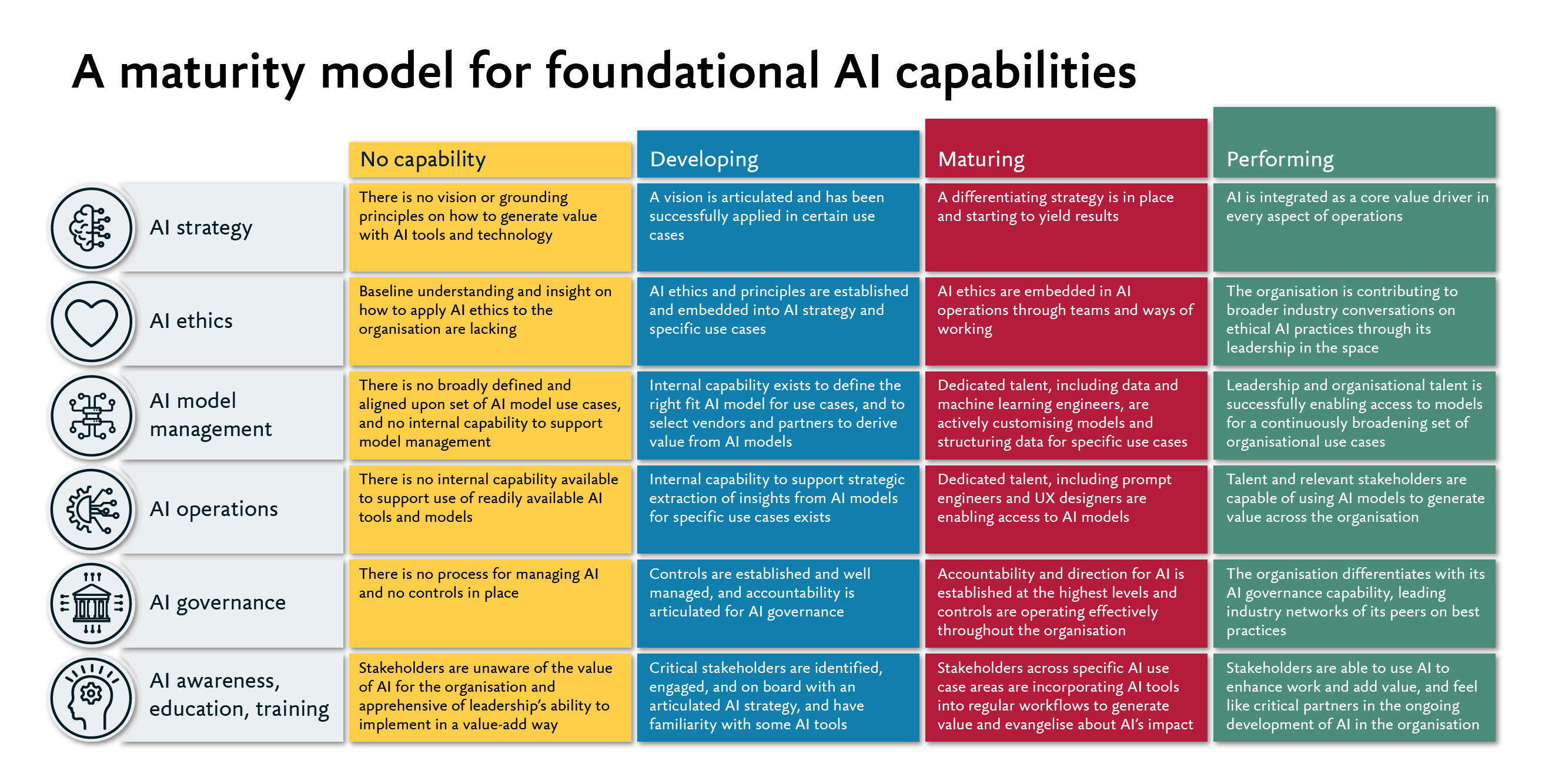Delivering the AI potential
Berkeley’s transformation experts can give you the edge in developing the strategy, capabilities and organisational engagement needed to capitalise on AI.
Artificial intelligence (AI) – with generative AI (GenAI) at the fore – has the potential to drive-up productivity and innovation, while reshaping your organisation along the way.
But AI is a means to an end, rather than an end in itself. Key priorities include determining how AI and AI applications can accelerate the delivery of your business objectives and what capabilities and surrounding operating model are needed to make this possible. It’s also important to judge how AI could disrupt your sector and how to get ahead of your competition.
And while all tech transformations are challenging, AI brings a whole new set of hurdles, from ethical issues and the need for responsible deployment to the impact on a potentially wary and unprepared workforce.
Trusted AI transformation partner
We can help you to realise your AI-enabled strategic ambitions. Clients choose us because of our AI consulting expertise and track record of delivering successful transformation.
As independent consultants, we can help you select, implement and operate the solution that is right for your business, both strategically and operationally.
We can also help you gauge the quality and alignment of AI performance to strategic and ethical goals.
We deploy small teams with deep transformation expertise, bringing all stakeholders together around common goals, tackling the complex implementation challenges and building trust in the AI and its outputs.
How can AI help us to realise our strategic ambitions?
The starting point is a clear, compelling and organisationally agreed vision for how artificial intelligence can augment your competitive strengths and help realise your strategic objectives. The results will help you to prioritise the capabilities needed to deliver your strategy, clarify the feasibility of use cases and strengthen the foundations for implementing AI as a transformational business tool.

How can we develop the capabilities to deliver our AI strategy?
By using a capability-driven approach, you can determine your differentiating strengths, how to play to them and how much to invest across each of these capability areas.

Foundational capabilities form the basis of an AI-driven transformation. These include the partnerships, organisational alignment and talent to drive value from an AI model. The foundational capabilities also include the governance and ethical approach needed to build trust and manage AI and AI applications successfully. With these foundations in place, you can begin to develop transformational capabilities in areas such as insight, innovation and continuous improvement.
How can we encourage our workforce to embrace and make the most of AI?
Key priorities include augmenting existing skillsets, identifying new skills and embedding these capabilities into day-to-day operations. Gearing up your workforce for AI-enabled ways of working can often require a rethink of organisational design and then job descriptions, roles and responsibilities.
Workforce engagement and buy-in is critical, especially as there may be some wariness about AI and AI applications. An important part of our work with clients is helping them to articulate and communicate the benefits of AI. This includes the chance to pass a lot of the drudgery and number crunching to the machines so employees can concentrate on deploying their skills and creating real value. We also believe that employees should have a say in the development of AI strategy from the outset – the more they contribute, the more they will feel like they ‘own’ the technology and can benefit from its implementation.
How can we build trust in Artificial Intelligence?
Trust is the new currency of AI. Customers need to be sure that you’re protecting their data and using it for their benefit. Your Board and employees need to be sure that the risks are being managed appropriately and that you’re meeting ever more stringent regulations. This is why ethical and responsible use of artificial intelligence is so critical and should be one of the foundational capabilities in your target operating model.
The starting point is clear principles for how AI and its outputs will be deployed, supported by effective governance, oversight and accountability. But principles aren’t enough on their own. The real test of AI maturity is the extent to which ethics are embedded into the mindset and day-to-day decision making of your organisation. Key questions include how can we do the right thing by ensuring our internal and external stakeholders are best served ethically through AI use in our products and services? Do we have the right level of transparency to both comply and lead our peers on AI performance and ethics?
How can we measure and develop the effectiveness of our AI and AI applications?
Our quick and easy online health check can help you to assess the extent to which the required capabilities are in place in your business and geared up to deliver value.

Client stories
IFCO
Rapid definition of an AI vision and roadmap
Berkeley helped IFCO, the world’s leading supplier of reusable packaging containers, to develop their AI strategy, vision and roadmap. Working in collaboration with the IFCO’s IT and business leadership, we helped the group to draft a vision statement and a set of guiding principles for using AI.
We also helped the group to assemble a shortlist of Generative and Predictive AI use cases across planning and operations, customer service, sales and IT, and identify the capabilities that IFCO would require to deliver these. We co-created a roadmap with costs to deliver the initial Minimum Viable Products (MVPs), as well a pragmatic plan to build IFCO’s internal AI capabilities – all agreed with the CIO and incorporated into IFCO’s wider IT strategy.
BSI Group
BSI Group is the global leader in standards and certification. They believed that unlocking digital capabilities such as Machine Learning, Artificial Intelligence and Blockchain would allow new service offerings to be developed, and rapidly increase the agility of existing standards’ development and assurance processes.
Berkeley worked with BSI’s IT Strategy Director and CIO to build a compelling narrative and business case to fund foundational work to develop a capability to lead the charge within the business.
Client stories
IFCO
Rapid definition of an AI vision and roadmap
Berkeley helped IFCO, the world’s leading supplier of reusable packaging containers, to develop their AI strategy, vision and roadmap. Working in collaboration with the IFCO’s IT and business leadership, we helped the group to draft a vision statement and a set of guiding principles for using AI.
We also helped the group to assemble a shortlist of Generative and Predictive AI use cases across planning and operations, customer service, sales and IT, and identify the capabilities that IFCO would require to deliver these. We co-created a roadmap with costs to deliver the initial Minimum Viable Products (MVPs), as well a pragmatic plan to build IFCO’s internal AI capabilities – all agreed with the CIO and incorporated into IFCO’s wider IT strategy.
BSI Group
BSI Group is the global leader in standards and certification. They believed that unlocking digital capabilities such as Machine Learning, Artificial Intelligence and Blockchain would allow new service offerings to be developed, and rapidly increase the agility of existing standards’ development and assurance processes.
Berkeley worked with BSI’s IT Strategy Director and CIO to build a compelling narrative and business case to fund foundational work to develop a capability to lead the charge within the business.
Clients often ask us...
Question 1
How do I deploy AI ethically and responsibly?
Question 2
How can I measure the benefits of AI investment?
Question 3
How can AI help me to achieve my business goals?
Question 4
How do I inspire and engage my leadership team on AI transformation?
Question 5
Who should take accountability for AI within my organisation?
Question 6
How do we engage the whole organisation on AI transformation?
Question 7
How do I build and invest in the right skills to deliver AI transformation?
Question 8
How do I design a roadmap to deliver our priority AI use cases?
Question 9
How do I assess data quality before and during AI transformation?





